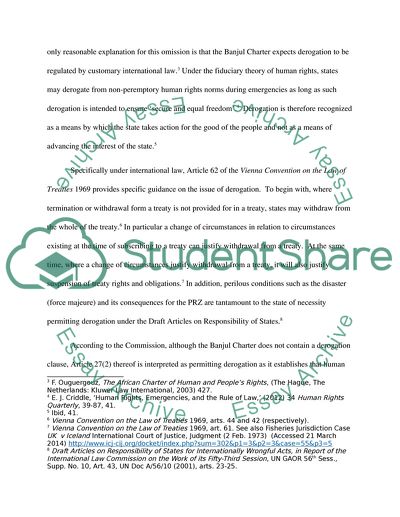Cite this document
(“Law Notes on Behalf of The Peoples Republic of Zambeziland Essay”, n.d.)
Law Notes on Behalf of The Peoples Republic of Zambeziland Essay. Retrieved from https://studentshare.org/law/1634272-please-provide-strong-legal-arguments-to-represent-on-a-moot-the-prz-this-is-an-imaginary-state-check-document-named-the-problem-scenario-against-the-legal-representation-that-the-ngo-makes-in-front-of-the-african-commission-on-human-and-people-rights
Law Notes on Behalf of The Peoples Republic of Zambeziland Essay. Retrieved from https://studentshare.org/law/1634272-please-provide-strong-legal-arguments-to-represent-on-a-moot-the-prz-this-is-an-imaginary-state-check-document-named-the-problem-scenario-against-the-legal-representation-that-the-ngo-makes-in-front-of-the-african-commission-on-human-and-people-rights
(Law Notes on Behalf of The Peoples Republic of Zambeziland Essay)
Law Notes on Behalf of The Peoples Republic of Zambeziland Essay. https://studentshare.org/law/1634272-please-provide-strong-legal-arguments-to-represent-on-a-moot-the-prz-this-is-an-imaginary-state-check-document-named-the-problem-scenario-against-the-legal-representation-that-the-ngo-makes-in-front-of-the-african-commission-on-human-and-people-rights.
Law Notes on Behalf of The Peoples Republic of Zambeziland Essay. https://studentshare.org/law/1634272-please-provide-strong-legal-arguments-to-represent-on-a-moot-the-prz-this-is-an-imaginary-state-check-document-named-the-problem-scenario-against-the-legal-representation-that-the-ngo-makes-in-front-of-the-african-commission-on-human-and-people-rights.
“Law Notes on Behalf of The Peoples Republic of Zambeziland Essay”, n.d. https://studentshare.org/law/1634272-please-provide-strong-legal-arguments-to-represent-on-a-moot-the-prz-this-is-an-imaginary-state-check-document-named-the-problem-scenario-against-the-legal-representation-that-the-ngo-makes-in-front-of-the-african-commission-on-human-and-people-rights.


